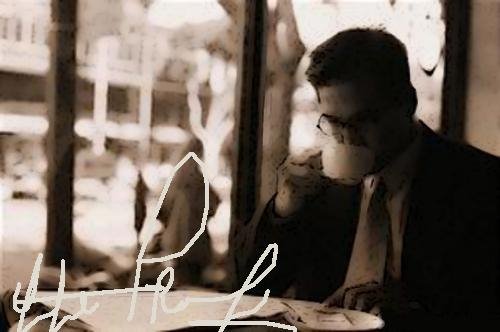 From Mocha to MartiniqueSome History on Coffee, taken from Henry Wessells
From Mocha to MartiniqueSome History on Coffee, taken from Henry WessellsThe German botanist and physician Leonhart Rauwolf of Augsburg traveled to Jerusalem (1573-1576), and upon his return published Aigentliche beschreibung der Raiß ... inn die Morgenländer in Lauingen in 1582. Rauwolf's account of his journeys represents the earliest printed reference to coffee in Europe.
Venetian traders in Istanbul were also aware of the beverage, and the Italian physician and botanist Prosper Alpinus took note of coffee on his voyage to Egypt in 1580, and published discussions of coffee in De Medicina Aegyptorum Libri quatuor (1591) and De Plantis Aegypti Liber (1592). The latter volume, on the flora of Egypt, includes the first published illustration of the coffee plant.
The first mention in English (as chaoua) appears in an edition of Linschooten's Travels translated from the Dutch and published in London in 1598. A more recognizable form of the word can be found in Sherley's Travels (1601), in a passage describing "a certain liquor which they call coffe." The spelling was still in flux, for in 1603 the English adventurer Captain John Smith (founder of Virginia) refers to "coffa" in his volume of travels.
The Venetians were in fact the first Europeans to import coffee, in 1615. The Dutch first shipped it directly from Mocha in Arabia the following year, although regular importations were still some decades away. Articles for preparing coffee were among the household effects carried by the Pilgrims on the voyage of the Mayflower in 1620, but not until 1670 was coffee sold in Boston.
Early mentions of coffee are to be found in the works of Francis Bacon, in Historia Vitae et Mortis (1623) and Sylva Sylvarum (1627), as well as in Burton's Anatomy of Melancholy (1632). The first botanical description of coffee in English was published by Parkinson in Theatrum Botanicum (1640).
The use of coffee spread rapidly throughout Europe after mid-century. Venice was the site of the first coffee house, opened in 1645, and one was opened in London in 1652. In Lyons in 1671, Philippe Sylvestre Dufour published De l'Usage du Café, du Thé et du Chocolat. Dialogue entre un médecin, un Indien, et un Bourgeois, the first substantial work on coffee in French. The first coffee house in Paris opened the following year.
One of the most important and widely read works on coffee, although somewhat later, is Jean de la Roque's Voyage de L'Arabie heureuse ... (1716), which recounted the history of French expeditions in the Red Sea from 1708 to 1710 and a second mission to the port of Mocha and the court of the King of Yemen during the years 1711 to 1713. La Roque described the coffee tree (with engraved plates), and provided a critical discussion of the history of the introduction of coffee into France in the latter part of this work, entitled Un Mémoire Concernant l'Arbre & le Fruit du Café. The Paris edition was followed by one published in Amsterdam the same year, with newly engraved plates. Gründliche und sichere Nachricht vom Cafée und Cafée-Baum, a German translation of the portion of the work concerning coffee, was published in Leipzig in 1717. An Italian translation of the entire work appeared in Venice in 1721, and English editions in 1726, 1732, and 1742. A notable Italian work dealing with the origins, cultivation, roasting, and preparation of the coffee, Ambrosia Arabica overa della Salutare Bevanda Cafe, by Angelo Rambaldi, was published in Bologna in 1691.
The Dutch were the first to experiment with growing coffee outside Arabia. Early plantations in Ceylon from the 1650s were followed by efforts to establish coffee in Java in 1699. A coffee seedling from Java was successfully transported to Amsterdam in 1706, and a plant grown from a seed of that tree was presented to Louis XIV of France in 1714. It was in this period, 1715 to 1725, that coffee was first grown in Surinam in South America, on the Caribbean island of Martinique, as well as on the island of Réunion in the Indian Ocean. Coffee was introduced to Brazil from the settlement at Cayenne in French Guiana in 1727.
___________________________________________________________




